Last month we looked at the question – What is a dog? This month we’re going to tackle – What is a puppy? Just as with us humans, a toddler isn’t a miniature adult, and a puppy isn’t a miniature dog. Their bodies are different than adult bodies and their behavior is different than adult behavior.
Puppyhood is the period from newborn to juvenile/adolescent. There are distinct stages of puppy development and growth, and these affect a puppy’s sensory abilities, motor function, cognition, and sociability. As newborns, puppies are blind and deaf. They sleep, they eat, they poop, they sleep some more. Within weeks, their eyes are open, teeth are erupting, they’re walking, wagging, barking, and eating solid food. These physical and behavioral changes, like those of all infant mammals, are intrinsic. They unfold because of how the puppy is built, so that the puppies don’t need to learn how to nurse and then learn how to chew – nursing and then chewing are hard-wired patterns of behavior that come along with the puppy brain and body.
As puppies get older, they are discovering and exploring their environment (littermates, mom, humans, indoors, outdoors, etc.) and learning how to interact with it to meet their needs. Puppies enter the “Socialization Period” of development around 3 weeks of age and it continues until around 12-14 weeks. In this stage of development puppies are exploring their world with their mouth and nose (remember, no thumbs!) and generally are learning safe vs unsafe and how to get what they like and avoid what they don’t like. They are also forming all sorts of social bonds with their family – dog and human alike – and learning how to communicate effectively.
Most importantly, this “Socialization Period” is the time when puppies are more curious than fearful of new things, and they can habituate to the normal features of their environment. This is important to understand because what a puppy learns during this time has a huge impact on how they will react around people, other dogs, and different environments as adults. With careful socialization during this stage, puppies can learn to not be frightened of new things and to develop social flexibility around people and dogs.
This is why trainers talk so much about the process of socializing your puppy before they are 4 months old. And this process of socialization can be fun and easy to do with just a little planning. The key is to provide systematic, positive exposure to the things we’d like our puppies to be comfortable with as adult dogs – people, other animals, the stuff of daily life (vacuum!), and environments. Luckily, the Portland training community offers lots of opportunities for safe socialization through structured Puppy Socials and Puppy Kindergarten classes. These give puppies the change to meet new dogs and people in ways that reduce the likelihood of disease and provide systematic, positive experiences for the puppies. And we can help too – Doggy Business offers in-person Puppy Kindergarten & Puppy Social classes and a drop-off Puppy Play & Learn Camp.
Believe it or not, puppyhood goes by in a blink. Have questions or need extra support? Shoot us an email at info@doggybusiness.net.
Want to learn more? We recommend;
- Puppy Start Right – Kenneth & Debbie Martin
- Canine Play Behavior; The Science of Dogs at Play, Mechtild Kaufer
- Meet Your Dog; The Game-Changing Guide to Understanding Your Dog’s Behavior, Kim Brophy



